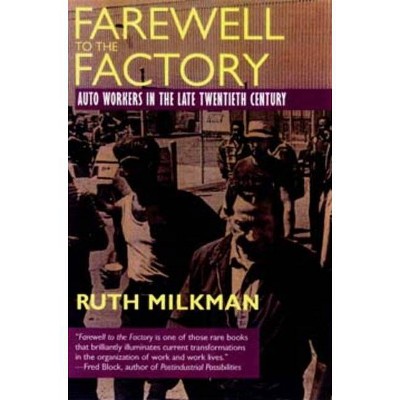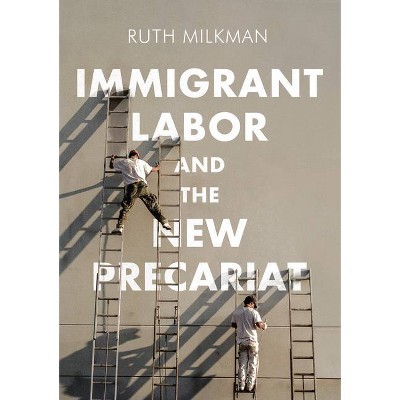Farewell to the Factory - by Ruth Milkman (Paperback)

Similar Products
Products of same category from the store
AllProduct info
<p/><br></br><p><b> About the Book </b></p></br></br>"A profound exploration into the decline of factory labor in the U.S. . . . Hers is one of those rare books that brilliantly illuminates current transformations in the organization of work and work lives."--Fred Block, author of "Postindustrial Possibilities" <BR>"Part ethnography and part contemporary labor history, Milkman's wonderful book will be required reading for anyone concerned with the transformation American industry has undergone in the past twenty years and what this transformation has meant for American workers."--David Brody, author of "Workers in Industrial America" <BR>"Behind all of the statistics on downsizing, the shrinking of our industrial base, and the folly of short-sighted management is the human drama of working women and men and their unions, struggling for dignity, fairness, and security. In "Farewell to the Factory," Ruth Milkman tells us the stories of workers in a New Jersey auto plant. Milkman's scholarship makes a valuable contribution to the national conversation on restoring the American Dream for working families."--John J. Sweeney, President, AFL-CIO <BR>"A fascinating case study of deindustrialization and restructuring by one of the leading social historians of the auto industry. The book is a great read and should be widely adopted in the classroom."--Michael Burawoy, University of California, Berkeley <BR>"Milkman's impressive study probes the contemporary meaning of work, freedom and dignity in a fashion both sociologically rigorous and culturally evocative. Avoiding liberal nostalgia over the demise of industial America, Milkman deploys a magnificantly textured set of interviews to demonstrate that auto workers hated the chronic stress and humiliation of factory work even as they clung to its high pay and good benefits."--Nelson Lichtenstein, author of "The Most Dangerous Man in Detroit: Walter Reuther and the Fate of American Labor"<p/><br></br><p><b> Book Synopsis </b></p></br></br>This study exposes the human side of the decline of the U.S. auto industry, tracing the experiences of two key groups of General Motors workers: those who took a cash buyout and left the factory, and those who remained and felt the effects of new technology and other workplace changes. Milkman's extensive interviews and surveys of workers from the Linden, New Jersey, GM plant reveal their profound hatred for the factory regime-a longstanding discontent made worse by the decline of the auto workers' union in the 1980s. One of the leading social historians of the auto industry, Ruth Milkman moves between changes in the wider industry and those in the Linden plant, bringing both a workers' perspective and a historical perspective to the study.<br /><br />Milkman finds that, contrary to the assumption in much of the literature on deindustrialization, the Linden buyout-takers express no nostalgia for the high-paying manufacturing jobs they left behind. Given the chance to make a new start in the late 1980s, they were eager to leave the plant with its authoritarian, prison-like conditions, and few have any regrets about their decision five years later. Despite the fact that the factory was retooled for robotics and that the management hoped to introduce a new participatory system of industrial relations, workers who remained express much less satisfaction with their lives and jobs.<br /><br />Milkman is adamant about allowing the workers to speak for themselves, and their hopes, frustrations, and insights add fresh and powerful perspectives to a debate that is often carried out over the heads of those whose lives are most affected by changes in the industry.<p/><br></br><p><b> From the Back Cover </b></p></br></br>A profound exploration into the decline of factory labor in the U.S. . . . Hers is one of those rare books that brilliantly illuminates current transformations in the organization of work and work lives.--Fred Block, author of <i>Postindustrial Possibilities</i><br /><br />Part ethnography and part contemporary labor history, Milkman's wonderful book will be required reading for anyone concerned with the transformation American industry has undergone in the past twenty years and what this transformation has meant for American workers.--David Brody, author of <i>Workers in Industrial America</i><br /><br />Behind all of the statistics on downsizing, the shrinking of our industrial base, and the folly of short-sighted management is the human drama of working women and men and their unions, struggling for dignity, fairness, and security. In <i>Farewell to the Factory</i>, Ruth Milkman tells us the stories of workers in a New Jersey auto plant. Milkman's scholarship makes a valuable contribution to the national conversation on restoring the American Dream for working families.--John J. Sweeney, President, AFL-CIO<br /><br />A fascinating case study of deindustrialization and restructuring by one of the leading social historians of the auto industry. The book is a great read and should be widely adopted in the classroom.--Michael Burawoy, University of California, Berkeley<br /><br />Milkman's impressive study probes the contemporary meaning of work, freedom and dignity in a fashion both sociologically rigorous and culturally evocative. Avoiding liberal nostalgia over the demise of industial America, Milkman deploys a magnificantly textured set of interviews to demonstrate that auto workers hated the chronic stress and humiliation of factory work even as they clung to its high pay and good benefits.--Nelson Lichtenstein, author of <i>The Most Dangerous Man in Detroit: Walter Reuther and the Fate of American Labor</i><p/><br></br><p><b> About the Author </b></p></br></br><b>Ruth Milkman</b> is Professor of Sociology at the University of California, Los Angeles, and author of <i>Gender at Work: The Dynamics of Job Segregation by Sex during World War II</i> (1987).
Price History
Price Archive shows prices from various stores, lets you see history and find the cheapest. There is no actual sale on the website. For all support, inquiry and suggestion messagescommunication@pricearchive.us




















